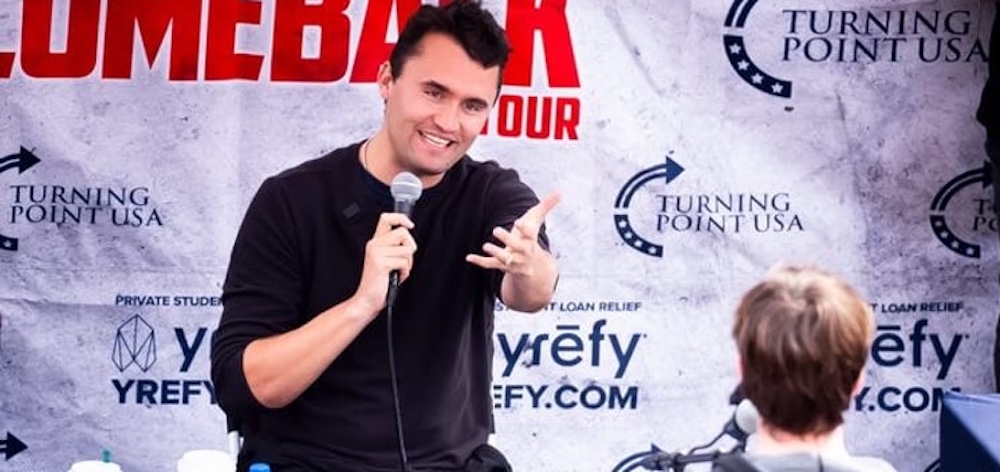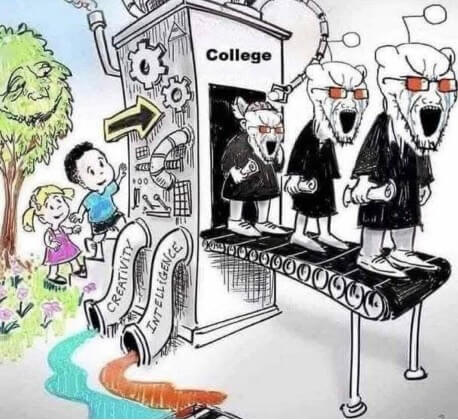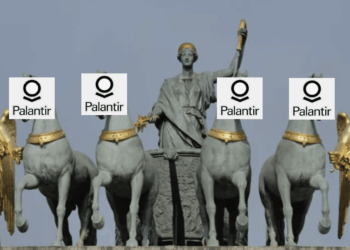“This is my broad opinion on AI (artificial intelligence),” said the man speaking to a crowd of over 1,500 students at the University of Tennessee. “For about 95% of what all of you guys are studying, AI will take your jobs in the next five years.”
This comment is from last March, by the late Charlie Kirk during a visit to U of T’s Knoxville campus. Kirk answered a student’s question about studying AI, considering Kirk’s well-known skepticism of the value of much of what passes for education in current American Academe.

The late Charlie Kirk, speaking at University of Tennessee last March. Courtesy Knox News/News Sentinel.
Kirk was a humble person, and certainly never presented himself as a scholar on the topic of AI. So, he may or may not have been correct about that 95% number, and/or what havoc AI will wreak on the job market over “the next five years.” On that point, we must live, learn, watch, wait and see.
Perhaps AI will eliminate less than 95% of jobs, and perhaps the looming juggernaut might take longer than five years to put many people out of work. But one way or another, Kirk nailed the point that a highly disruptive AI trend is taking shape. More on that in just a moment…
Meanwhile, the AI investment boom has already delivered huge gains to investors who bought early, and even to investors who jumped aboard the proverbial moving train a bit late, as it left the station.
For example, and to highlight just a few names among many, we’ve seen huge moves in share price for companies that make advanced computer chips (NVDIA Corp.; NVDA), and the machinery that makes chips (ASML Holdings; ASML); software plays and system integrators (Oracle Corp; ORCL); and certainly, with the energy angle that powers AI and ranges from electric utilities (Constellation Energy; CEG) to equipment makers (GE Vernova; GEV).
Again, more on this this last angle in a moment as well…
Nihilist Extremism
But first, no doubt you know that Charlie Kirk was gunned down last week while hosting one of his trademark debate events (“Prove Me Wrong!”), this time at Utah Valley University, outside of Salt Lake City. He was assassinated by a sniper who fired a single shot. And the shooter – the “alleged shooter” as we’re supposed to say – is in custody.
The suspect is 22 years old and wasn’t associated with the university. Indeed, news accounts state that a couple of years ago, this guy dropped out of an entirely different college and enrolled in a trade school. He walked onto the Utah Valley campus last week for one reason only…
As is almost always the case, right now there’s much we don’t know. The state and federal investigation is ongoing, although it’s not out of bounds to say that, based on recovered communications, perhaps the perp had associates. And perhaps he’s not just another “disturbed lone gunman” of popular myth when important people get shot. We’ll see.
Plus, in this same context we have a developing, fast-growing narrative about how certain kinds of people become criminally radicalized by what they see and follow on the internet and social media (more accurately, “anti-social media”). Birds of a feather, so to speak.
In fact, the man in custody appears to be a subset of disgruntled humanity that intelligence services refer to as “nihilist extremists.” As derived from the Latin word nihil, which means “nothing,” and the belief in a sense of nothingness. But in the case of certain individuals, they take their nothingness to the far edges of misconduct. In this particular case it was the cold-blooded public execution of a private citizen who also happened to be a nationally recognized public and politically influential figure.
To me at least, the murder of Charlie Kirk is arguably the highest profile political assassination in America since the 1960s; since the days of Robert Kennedy, Sr. and Martin Luther King. (Note: President Reagan survived his 1981 encounter, just barely.) And this leads to a couple of points.
Definitely (as in… obviously), many American colleges and universities lean politically left. Just visit a few campuses and walk around. And it’s not out of bounds – not for me, anyhow – to opine that a distressingly large number of impressionable young minds have been ruined by exposure to the Marxian milieus that dominate many humanities and social science departments within so-called “higher” education.

Cartoon that speaks for itself. Courtesy Zero Hedge.
Meanwhile, saving or salvaging young people from a lifetime intellectual handicap of early-onset, left-wing indoctrination was among Charlie Kirk’s missions in life, and brought him to his fateful, fatal visit to Utah last week. He was good at his job, so yeah, somebody shot him.
At the same time, in this instance it’s evident that Kirk’s shooter was not radicalized in college; as noted above, the guy dropped out of a completely different school and there was no first-hand college knowledge inside this fellow’s head. In other words, with whatever degree of radicalism we have with Kirk’s assassin, he apparently picked it up on his own, inside the echo chambers of online content that he followed. Looking ahead, it’s likely that forensic investigators will scrub his internet history for everything they can find; maybe we’ll learn a few things.
And this brings up something that I’ve heard from more than a few college and university faculty members. Namely, that many incoming students show up at the front gates already radicalized by their high school experiences at both public and private/independent secondary schools. So, the left-oriented indoctrination machine is not entirely a collegiate phenomenon because more than a few secondary schools have also been overrun and captured as well.
Plus, an even broader issue is at work here. It’s that anymore, young people everywhere have grown up in an unfiltered world of smart phones and global-scale internet access to anything and everything that can flow through the fibers and Wi-Fi channels. The good, the bad, and the ugly.
The takeaway is that we’re now reaping the harvest of about a (so-far) 20-year, uncontrolled, mass-psychological experiment. In essence, American society, and the nation’s overall economic system, allowed everyone – certainly children and young adults – to have constant, instant access to everything that’s out there in the ether. Which prompts one to ask, “Was this ever a good idea?”
Sure, some kids have benefitted greatly from their lifetime of online access. Perhaps they became much smarter, much faster, at a much earlier age than otherwise might have been the case. Hey, maybe some of them now work for SpaceX, building better rocket engines. Or they’re changing the world for the better in other ways.
But other people – obviously, look at the recent Kirk shooter – hung out online, fried their brain with antisocial content, and became dangerously radicalized. In short, they developed a deeply flawed moral compass and bizarre worldviews.
Meanwhile, it’s not as if Kirk’s shooter is some sort of impressionable dummy. From news accounts the perp is supposedly an intelligent person. One report stated that he scored an impressive 34 out of 36 on the ACT, a high school standardized exam that’s widely used to rank applicants by college admission committees. And in this regard, Kirk’s shooter joins quite a rogues’ gallery of otherwise-intelligent people who traveled down a dark road.
For example, Thomas Crooks, the 20-year-old who shot President Trump last year in Butler, Pennsylvania reputedly scored over 1500 on his SAT exams, a result good enough to be considered as an entrant for even the most competitive of colleges.
Or think back to other eras and instances when smart people went bad. For example, in the 1960s a young Ted Kaczynski (aka the Unabomber) earned a degree in mathematics from Harvard and then an MS and PhD in math from the University of Michigan. And going further back in history to 1865, a then-26-year-old John Wilkes Booth – among the greatest and fastest-rising Shakespearean actors of his era – assassinated President Abraham Lincoln.
In this regard, it’s not as if political radicalization is a modern phenomenon. Nor even nihilism and extremism, because the archives of time reveal many young guys who crossed the lines and did terrible things. But anymore, it also appears that our internet age is capable of creating and spreading dysfunction and radicalization at wide, even industrial scale and affecting growing numbers of people.
Here’s the quandary: we have an open system that leads more and more people to go nihilist, and then down extreme pathways. Which brings us back to Charlie Kirk’s comment about AI taking away jobs…
AI: America’s Next Uncontrolled Social Experiment
“I love that,” said Kirk to his questioner. “I love the AI discussion because it’s going to flush out ethical arguments immediately. … It is going to force the greatest question of what is a human being? What is right? What is wrong? So I’m curious, at the University of Tennessee, what do they consider to be ethical?”
Well, here we have some unusual questions! And from Charlie Kirk, who was upfront about the fact that he never attended college or university. He turned 18 and went into business with his Turning Point organization.
Usually, public discussion of AI is about how great and wonderful it is. And about all the companies whose shares are soaring in the stock market. Or the hundreds of billions of dollars of capital investment going into hardware, software, data centers, electric power and more. Or the hype about what AI is already doing, and how it will eventually do even more and better in the future. That, and if “we” don’t somehow win the ongoing global AI arms race, China will win it and dominate the world.
And there was Charlie Kirk in Knoxville, pondering the ethics of AI. Right away, one gets the sense that he foreshadowed his own eventual, tragic fate at the hands of a guy (or maybe a cabal of guys) who used existing online content to override any sense of classical ethics, and to spool himself/themselves to the point of targeted assassination.
Another way to frame the issue is that the past 20-plus years of unfettered growth of the internet, and online access to anything/everything, has led to a national-scale level of political polarization that we see now (and certainly, with the above-noted nihilist extremist crowd).
So, looking ahead, what might we expect from the next 20-plus years of AI? Well first, nobody knows, although this last question is absolutely worth pondering because AI is already many steps above the mere, day-to-day, old-fashioned internet thingy. Indeed, AI is a process that scrapes entire libraries of data from the online archives, and reshapes it and reforms it into… well, into what?
Okay sure, it’s one thing for a high school or college kid to use AI to “help” write a term paper; and yes, I’m being charitable here. It’s quite another when AI takes over key elements of how we run society. Think in terms of AI-generated news, government policy stances, economic and even military decisions. (Whoops, too late; many military decisions are already AI-driven, up to and including when to fire weapons and at what targets.)
Meanwhile, let’s return to Kirk’s comment that I used at the beginning of this note, about how “AI will take your jobs in the next five years.” Umm, yes… That’s already happening.
Consider the news accounts of companies across the spectrum that are replacing people with AI, from banks and real estate to medicine and factory production. Just scan a few headlines about how difficult it is for young college grads to find jobs anymore, and how many young people are taking whatever work they can land, just to have a paycheck, versus finding a job in what they studied in school.
So, per Charlie Kirk, AI will take away the jobs that college kids hope to have. And there, he has bracketed one key the point. What does the AI future hold?
Well, the irony is that even big-name AI plays (the usual suspects) offer diminishing hope ever to justify their currently lofty share prices. That is, much of the AI race involves spending massive capex up front on equipment, buildouts, software and some sort of whiz-bang product to offer for sale.
But the AI sales numbers – revenues that ring the cash register – are generally awful. And the dark implication is that all this up-front outlay is driving the broad sector towards commodity-level pricing, which means that few players will ever make any serious money.
There’s an argument to be made that AI – well, AI as currently practiced – is a massive misallocation of resources, with next to no real forecast about what it will do to large and growing segments of the populace. Radicalization, anyone? Nihilism? Extremism? Hey, give it time.
Sadly and tragically, we won’t have Charlie Kirk anymore, out there asking simple but insightful questions and debating the replies. In this regard, it falls to others to confront the orthodoxy of big money flowing willy-nilly into untested ideas and undiscovered lands.
Oh, and if you have made some good money in AI, be sure to take a whack off the table and find another home for it when things begin to crater. Buy gold, for example.
That’s all for now.
Thank you for subscribing and reading.














